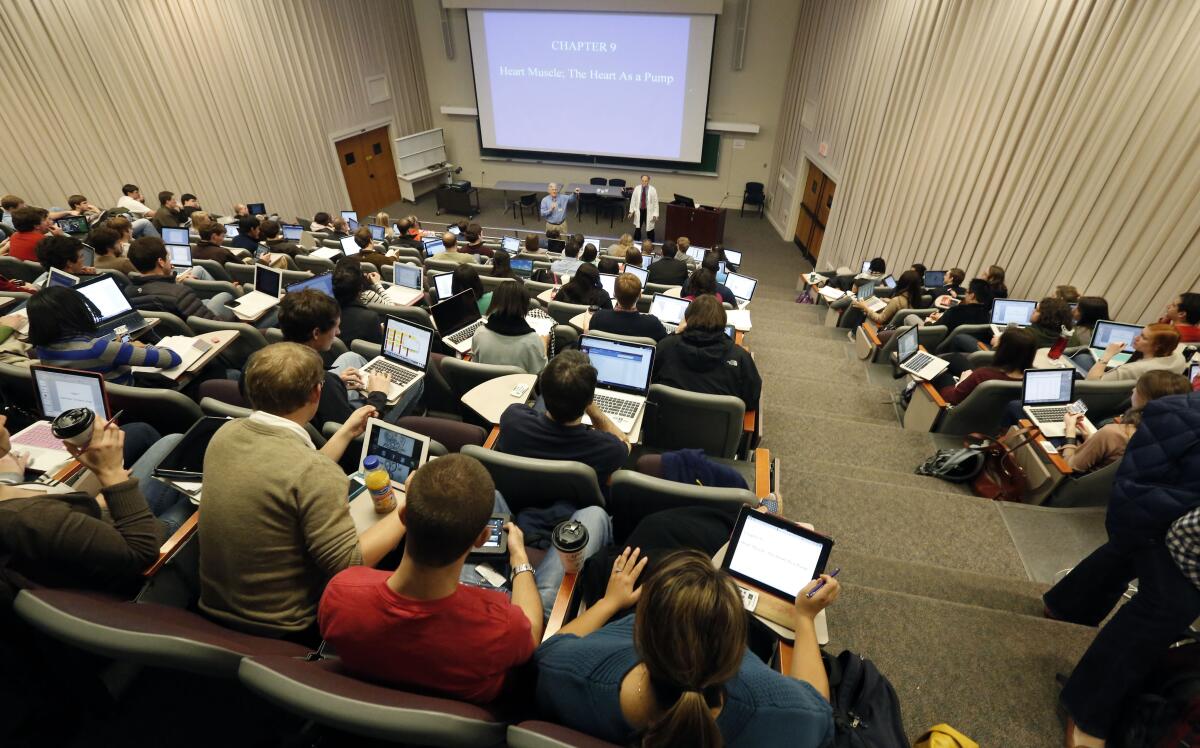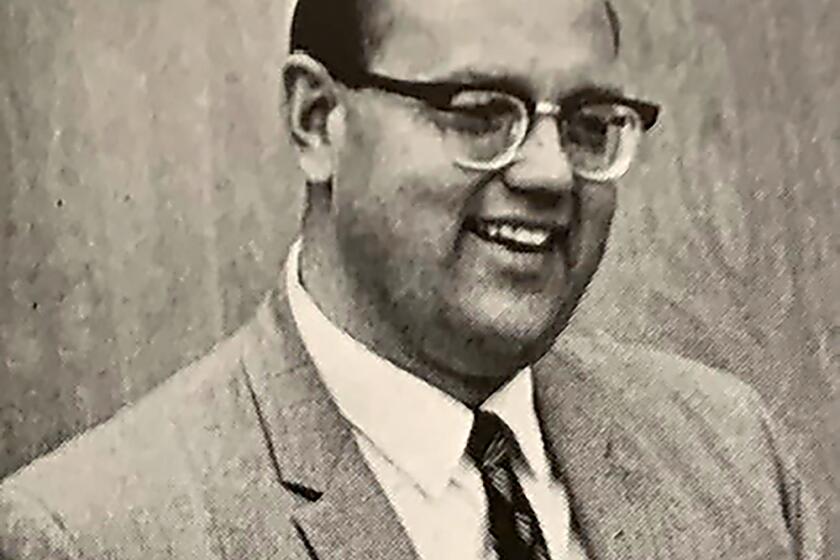Op-Ed: Listen up, college students. You don’t ‘get’ a grade. You have to earn it

Every fall, my mental timeline is flooded with memories of the teachers who changed my life. And last week — when I read about the controversial termination of Maitland Jones Jr., a distinguished New York University professor whose courses in organic chemistry were deemed too hard by students hoping to get into medicine — it took me back to the September I met my toughest teacher.
It was 1994, and I was a 19-year-old student in my third year at Western University in London, Ontario. I had signed up for a course in the department of English taught by one Donald S. Hair. My first clue that professor Hair would defy expectations? He was bald.
Standing at the lectern in a three-piece suit, he took roll, ever-so-properly referring to each of us as “Miss” or “Mister.” It was a distinct shift from the vaguely beatnik tone of many of our other professors, with whom students could sometimes be found drinking beer at one of the campus pubs.
A few weeks into the class, the professor administered our first test. I didn’t think I had anything to worry about — until he handed my exam back the following week with a 67 written on it in red ink.
Sixty-seven! I’d never received such a low mark. I was dependent on a scholarship, and any grade below 80 put my future in jeopardy. My seatmate’s murderous expression revealed her mark had been miserable too. We fumed silently: Professor Hair was an old weirdo! How dare he derail our GPAs? What was the old boy’s problem, anyway?
But the real problem was this: He was right. I knew it as soon as I’d cooled off and taken the time to digest his comments. My writing was sloppy, my understanding of key concepts superficial. Like many of my peers, I was used to earning top grades. Now, for the first time, a teacher had introduced an uncomfortable question. Were we actually “earning” them?
Mr. C, at Beverly Hills High, was one of the best of the best. His former students told him so at a recent reunion.
The next day, I went to his office. With burning cheeks, I told him I knew I’d butchered the exam. To my childish surprise, he wasn’t a “weirdo” in the least. He was funny, warm and uncommonly patient. He assured me if I worked hard, I’d achieve my potential in the course, and he’d be available to help me.
I went away, read and read some more. The more I read, the more interesting his classes became, and soon, his complex, spellbinding lectures were the highlight of my week. I worked my guts out in that course. The grade I earned in his class was the lowest I’d receive that year. But I had earned that grade. Nearly 30 years later, I’m still proud of that.
The anger and despair healthcare workers carry around can be set off when trifles are offered and basic needs on the job are ignored.
As an associate dean and teacher of medical students for the last 20 years, I’ve spent a lot of time thinking about what usually makes a good doctor — and it isn’t organic chemistry. I disagree with the colleague of professor Jones who told the New York Times that he did not want anyone treating patients who did not “appreciate transformations at the molecular level.” The comment struck me as slightly less outdated than keeping a bag of leeches for emergency bloodletting. There is ample evidence other paths prepare students extremely well for a career in medicine.
That issue is a sideshow anyway, because the strong public reaction to this story is largely about something else: the commodification of education. For U.S. medical schools, the Assn. of American Medical Colleges oversees a rigorous and detailed accreditation process, which relies on the collection of mounds of data — including an exit survey that can heavily influence the school’s accreditation outcome. The survey begins by asking students to rate the degree to which they agree or disagree with this statement: “Overall, I am satisfied with the quality of my medical education.”
Is that the right way to ask someone to evaluate their education? It seems more appropriate for rating their Starbucks latte. My job is not to ensure my children — or my students — are always “satisfied.” That metric would worsen the quality of my parenting and my teaching; both require me to do unpopular things if I am to do my job well. “Satisfaction” is the language of consumer experience, and when it becomes a target metric, it alters something fundamental about the interaction between people.
I have felt that shift as an educator. I’ve witnessed, and championed, long-overdue changes in the learning environment, including a focus on the psychological safety of students. But I’ve seen disheartening changes too — namely the evolution of a relationship with students that sometimes feels transactional, as if the primary objective is no longer just about turning them into doctors but, rather, keeping them constantly satisfied, the teacher less preceptor than proprietor.
That shift is deeply, deeply unsatisfying.
Long after I’d moved on from Western University, I heard professor Hair had been nominated for an award for excellence in teaching. “Professors are often afraid to employ his high standards,” I eagerly wrote in a two-page letter of support. “Setting the bar higher may initially be uncomfortable, but it gives students … a sense of self-respect and pride which is stolen from us when we work in circumstances where such experiences do not exist.” He won that award. And he also earned it.
If my low grade in professor Hair’s class had been a barrier to me becoming a doctor, would I feel differently? I really don’t know. I suppose I thought he had a right to be tough as long as he was also trying to be fair. The irony? What I learned from him made me a better doctor. Not because I was satisfied.
Because I grew.
Jillian Horton is a writer and physician. She is the author of “We Are All Perfectly Fine: A Memoir of Love, Medicine and Healing.” @jillianhortonMD
More to Read
A cure for the common opinion
Get thought-provoking perspectives with our weekly newsletter.
You may occasionally receive promotional content from the Los Angeles Times.












